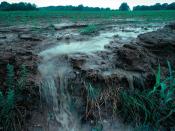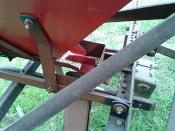Agricultural Chemistry
Modern agriculture depends quite heavily on the advances that have been made in science and chemistry in particular, to maximize the yield of crops and animal products. Fertilizers, pesticides, and antibiotics play ever increasing roles in this field.
Fertilizers are perhaps the most widely used form of chemical in agriculture. Fertilizers are added to the soil in which crops are growing to provide nutrients required by the plants. Fertilizers can be divided into two categories: organic and inorganic. Organic fertilizers are derived from living systems and include animal manure, guano (bird or bat excrement), fish and bone meal, and compost. These organic fertilizers are decomposed by microorganisms in the soil to release their nutrients. These nutrients are then taken up by the plants. Inorganic or chemical fertilizers are less chemically complex and usually more highly concentrated. They can be formulated to provide the correct balance of nutrients for the specific crop that is being grown.
Both organic and inorganic fertilizers supply the nutrients required for maximum growth of the crop. Inorganic fertilizers contain higher concentrations of chemicals that may be in short supply in the soil. The major or macro- nutrients in inorganic fertilizers are nitrogen, phosphorous, and potassium. These fertilizers also may provide other nutrients in much smaller quantities (micro-nutrients).
With the expansion of cities due to increases in population, there has been a loss of agricultural land. Appropriate use of fertilizers to increase crop has in part counterbalanced this loss of land. The use of fertilizers is not without it's faults, however. There are concerns that adding supplements of nitrogen, particularly in the form of inorganic fertilizers, can be detrimental. It is thought that adding additional nitrogen to the soil can disrupt the action of nitrogen-fixing bacteria, an important part of the nitrogen cycle. If these...


